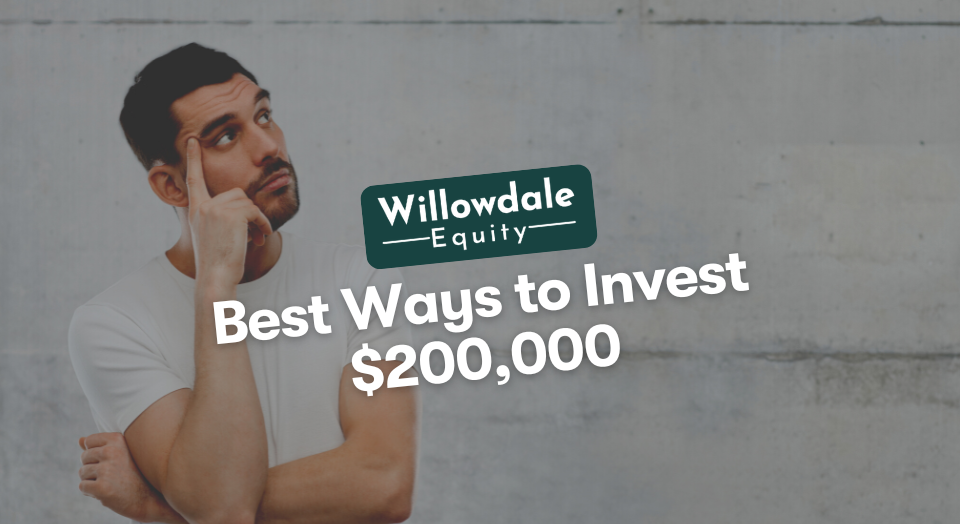
Should I Invest In Real Estate Now?: Why Should You Invest in Real Estate (Pros & Cons)
This article is part of our passive investors guide on real estate syndications, available here.
There are a lot of questions that go into the decision of whether or not to invest in real estate. For many people, it can be difficult to tell if now is the right time to make this kind of investment.
In this blog post, we will explore why you should consider real estate investing today. We will also examine some of the risks and rewards associated with this investment. So, when you ask yourself “should I invest in real estate?”, the answer is yes – but only if you do the proper research beforehand.
Key Takeaways
-
Consider your financial situation. How much can you afford to spend on a property? Are you prepared to deal with potential losses if the investment goes wrong?
-
Real estate is often considered a safe investment because it is a tangible asset that can be seen and touched. Unlike stocks or other investment vehicles, real estate is a physical asset that people can rely on.
-
Real estate is a great way to generate passive income and a great way to build wealth over time and can be very helpful in achieving financial independence.
-
Many people use the phrase, “it’s not about timing the market; it’s about TIME IN the market,” and this couldn’t be more true when it comes to amortization. This means that someone else will pay down your debt for you.
What to consider before investing in real estate
Before you invest in any property, there are a few things you need to take into account. For example, what is the current state of the real estate market? Is now a good time to buy? What about the potential for future growth?
Another thing to consider is your financial situation. How much can you afford to spend on a property? Are you prepared to deal with potential losses if the investment goes wrong? And finally, do you have the necessary skills and knowledge to manage an investment property yourself? If you can answer these questions honestly and accurately, you’re ready to start thinking about becoming a real estate investor.
Should You Invest in Real Estate? - (The Pros)

Investing in real estate can be a great way to build wealth over time. However, like any other investment, risks and rewards are associated with this type of investment decision. Let’s take a look at some of the pros of investing in real estate:
1. The Security That Real estate Offers is Unmatched
Real estate is often considered a safe investment because it is a tangible asset that can be seen and touched. Unlike stocks or other investment vehicles, real estate is a physical asset that people can rely on. This makes it a very safe investment choice for many people.
2. Real estate Can Be Use as Collateral
Another reason real estate is such a significant investment is that it can be used as collateral for loans. If you ever need to borrow money, you can use your property as security for the loan. This makes it much easier to get approved and also can contribute to a lower interest rate.
3. Property Values Have Historically Increased Over Time
Investors in real estate also benefit from the potential for equity growth. Over time, property values have historically increased, allowing investors to make a profit when they sell their property. This is not always guaranteed, but a strong possibility should be considered.
4. Real Estate Can Be a Source of Passive Income
Another great benefit of investing in real estate is the potential for passive income. This means you can earn money from your property even when you’re not actively working on it. Passive income is a great way to build wealth over time and can be very helpful in achieving financial independence.
5. Tax Advantages
Many tax advantages come with investing in real estate. For example, you can deduct certain expenses related to your property, such as mortgage interest, property taxes, and repairs. Also, investors in real estate have the opportunity to take advantage of something called a 1031 exchange. This special IRS rule allows investors to sell their property and reinvest the proceeds into another property without paying any sales taxes. This can be a great way to keep more money in your pocket and help you grow your portfolio more quickly.
Should You Invest in Real Estate? - (The Cons)
1. Real Estate is Complex and Can Be Risky.
The risks in real estate are higher when you lack experience. Things can go wrong (e.g., tenants not paying rent, contractors or property managers taking advantage, etc.) There are ways to alter the risk level when investing in real estate but returns usually worsen as the risk is reduced.
2. There is No Guarantee That Property Values Will Rise in The Future

Property values have increased in the past doesn’t guarantee they will in the future. In most cases, property values will rise, but if you own investment properties in areas people don’t want to live in, this becomes a potential downside.
3. Can Be Difficult to Find Good Tenants
If you’re a landlord, one of your biggest concerns is finding good tenants. This can be difficult and time-consuming, and if you don’t have good tenants, it can lead to significant headaches (and financial losses) down the road. Bad tenants can single-handedly ruin your investment.
4. Property Management Can Be Time-Consuming and Expensive
Property management can be a time-consuming and expensive process. If you’re unable to manage your property yourself, you’ll need to hire someone to do it for you. This can be costly and may eat your profits if you don’t have the right property.
Where Should I Invest in Real Estate ?
Where you should invest is up to many factors, such as your comfort level, how close you feel you need to be to the property and the demographic, population, and migration trends of the property’s market.
The market fundamentals save your butt if you miss a few things in your underwriting. That being said, as a general statement, the southeastern United States has seen a significant migration trend to the area. The projection is that this trend will continue moving forward, which can be attributed to social, political, economic, and weather-related drivers.
How To Know If Now Is The Right Time To Invest In Real Estate
You can be sure that now is a good time to invest in real estate because real estate has historically gone up in value over time. Of course, there are no guarantees in life, and there is always the potential for a housing market crash, but real estate is a sure bet if you are looking for a long-term investment.
Also, the sooner you start investing in real estate, the sooner you begin amortizing. Amortization is a fancy word for “paying down debt.” The longer you wait to invest in real estate, the longer it takes for the process to begin.
The Sooner You'll Reap The Benefits
Many people use the phrase, “it’s not about timing the market; it’s about TIME IN the market,” and this couldn’t be more true when it comes to amortization. This means that someone else will pay down your debt for you.
The sooner you purchase real estate, the sooner you can enjoy the positive cash flow that comes with it. Cash flow is the excess cash left over after all the bills, like insurance, property taxes, mortgage payments, etc., are paid. This makes real estate investing attractive because it can provide a passive income stream. The sooner you invest in your first rental property, the quicker you’ll earn additional passive monthly income, which can be used towards more real estate investments.
What To Do Before You Begin Real Estate Investing
If you’re thinking about investing in real estate, the most important thing you can do is educate yourself. There is a lot to learn, and the more you know, the better equipped you’ll be to make wise investment decisions.
Next, you need to assess how much money you have to invest. This will help you to determine what type of property you can afford and what kind of return on investment you can expect.
You’ll also have to determine how much time you’re willing to commit to your real estate investing strategy. Flipping homes is considered a very active investment strategy, while collecting rental income from owning rental properties is considered more passive.
Why Not Invest in Real Estate: The Risks
While there are many potential rewards from investing in real estate, it’s essential to be aware of the risks involved and the best ways to mitigate them. Some of the most common threats to real estate investors are being taken advantage of by contractors.
One of the best ways to make real estate investments more profitable is by buying distressed houses and renovating them. Whether you hold these properties for a long time or sell them for a quick profit, the concept of renovating real estate is by far the most common way to quickly increase the property value of any real estate investment. Unless you plan on doing the work yourself, renovating properties usually involves a contractor, and the possibility of getting taken advantage of is high if you’re not careful. The last thing you want from your real estate investment is to lose money.
Contractor Vulnerability
When working with contractors, you must do your due diligence and vet them carefully. Make sure they’re licensed and insured, and try to get recommendations from other real estate investors who have previously worked with them.
Another potential risk is that your tenants might not pay their rent on time or at all. This is why it’s so important to screen your tenants carefully and ensure that you’re only leasing to qualify tenants with jobs, a good credit score, and responsible adults who will do a good job taking good care of your investment.
Related Read: The Cost to Build an Apartment Complex in Today’s Market
Why Its Never A Bad Time To Invest In Multifamily Rental Property

Multifamily Real estate is the best real estate investment there is. The incredible thing about this type of investment is that it’s always in demand since people will always need a place to live. By definition, multifamily real estate is a property with five or more units. Ideally, you’d want only to buy 50 units or more. Still, the larger the property is, the more insulated it is from bad tenants or periods of higher vacancy.
The biggest problem with this type of investment property is the relatively high barrier to entry. Not only do you need a lot of money to buy the property, but you’ll also need to have the cash flow to manage it. For these reasons, the average investor cannot purchase multifamily rental properties. However, there is a solution, and it’s called a real estate syndication.
What Is A Real Estate Syndication?
A real estate syndication is a pooled investment vehicle where multiple investors come together to purchase a large multifamily rental property. Each investor in the syndicate owns a percentage of the overall property and shares in the profits or losses generated from it.
The most significant benefit of investing in a real estate syndication is that it allows you to own large multifamily rental properties without determining the total purchase price.
For example, let’s say you wanted to buy a 200-unit apartment complex that costs 20 million USD. If you were going to do this by yourself, you would need to come up with about 6.5 million USD. However, if you were part of a real estate syndicate, you could invest as little as $50,000, and own just a piece of the property.
Frequently Asked Questions About Why Should You Invest in Real Estate
Yes, real Estate is a great place to invest your money. It’s a solid investment that will appreciate over time and a tangible asset you can see and touch. Real Estate has been and will continue to be a wise investment because it will always be there in the future. The same can’t be said for other investments.
People invest in real estate for many reasons. Some people invest because they want to make a quick profit, while others invest for the long term and are more interested in the appreciation of the property. Either way, people invest in real estate because they want to make money, similar to why people invest in the stock market.
The best way to figure out what kind of investor you are is to ask yourself how much risk you’re willing to take on. Are you someone who wants to buy a property and hold it for the long term, or are you looking for a quick flip? Your answer will determine what type of real estate investing strategy fits you best.
Should I Invest In Real Estate Now - Conclusion
So, should you invest in real estate now? The answer is a qualified yes. While any investment is always associated with risks, the current market conditions indicate that buying property now could be a wise decision.
Property values are still relatively low compared to historic highs, interest rates are still relatively low, and there is an abundance of potential properties on the market. If you have the financial resources available and feel comfortable taking on the risk, investing in real estate now could be one of the best decisions you make this year.
Interested In Learning More About PASSIVE Real Estate Investing In Multifamily Properties?
Get Access to the FREE 5 Day PASSIVE Real Estate Investing Crash Course.
In this video crash course, you’ll learn everything you need to know from A to Z
about passive investing in multifamily real estate.
We’ll cover topics like earned income vs passive income, the tax advantages, why multifamily, inflation, how syndications work, and much much more!




